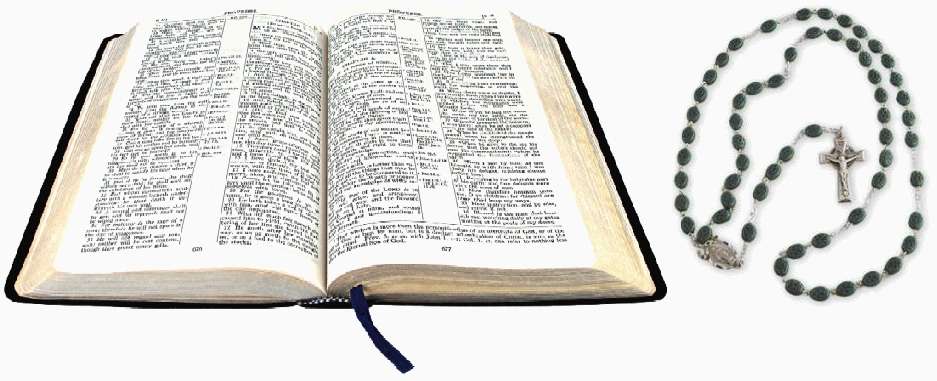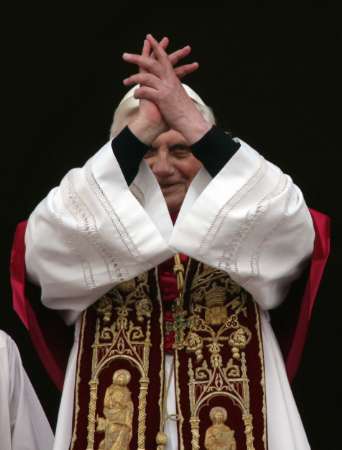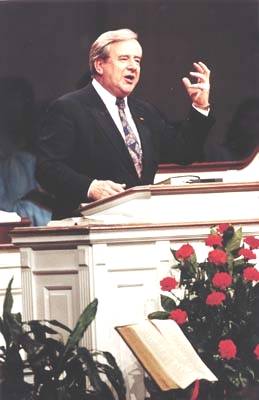
Baptist vs. Roman Catholic Beliefs
The term "Baptist" refers to a person who believes in the adult "baptism of believers" in Jesus. In other words, Baptists are those who claim a personal faith in Christ alone for salvation, who also reject the baptism of infants, believing that only adult believers in Jesus, (or those at least old enough to actually understand about trusting in Christ), should be baptized. They also do not believe that baptism itself saves them from their sins.
The term "Catholic" means "Universal". It generally refers to the "Roman Catholic Church", which for most of these last two thousand years has been the largest and most organized religious group "within" Christendom.
During the later part of the Middle Ages, some people who were studying the Bible became convinced that infant baptism, (i.e. the sprinkling of babies with water by a priest), was unscriptural. As a result, these men began to "re-baptize" each other. The word "Ana-Baptist" ("Anabaptist") means "re-baptizer". These people were called "re"-baptizers by Roman Catholics and Protestants, (because most of these Baptists had already been "sprinkled" by the Roman Catholic Church when they were infants.)
There were millions of such Anabaptists and other early Baptists between the end of the Middle Ages and the early Reformation period.
The Anabaptists (Baptists), based their insistence on the baptism of non-infants who believed on Jesus Christ alone for salvation on three primary arguments:
(1) The Bible does not mention any babies or small children being baptized. (There is no record of infants being baptized in the Bible.)
(2) The word for "baptize" in the original Greek means "to immerse" in water.
(3) The Bible says that those who believe may be baptized. Since infants cannot understand, and therefore cannot believe on Jesus Christ, baptism must then be for adults, or at least for those old enough to understand. It must not be for infants. Also, Baptists believe that baptism plays no part in salvation itself.
During this period of time, the act of infant baptism was widely practiced throughout Europe. In some places, infant baptism was practically considered to be a part of the rite of citizenship, (almost like a birth certificate is today). Therefore, those rejecting infant baptism were often accused of disloyalty or rebellion against civil government.
These Baptists were also often hated and persecuted by the Roman Catholic Church -- which by this time strongly promoted the practice of infant baptism. (The Roman Catholic Church had originally practiced the immersion of adults, but by this time in history, the sprinkling of adults and then of infants had become its main practice.) Therefore, a rejection by Baptists of infant baptism was often considered to be an attack or subversion against the Roman Catholic Church itself. For this reason, many Popes, and those under them, ordered the persecution of these "rebellious" Baptists.
Another reason for the persecution of Baptists was their insistence on "believers only" baptism, which was seen as an attack on the "salvation by works" theology widely taught by the Roman Catholic Church. During this period of time, millions of Baptists and others had their property confiscated and many of them were tortured. Millions of Baptists were killed under direct or indirect influence of the Roman Catholic Church.
The Reformation brought three main groups of Protestants into existence: These were the "Calvinists", founded by John Calvin in Northern Europe; the "Anglicans", (or "Church of England"); and the "Lutherans", (founded in Germany by the former monk, Martin Luther). These three, together with a few other smaller groups, comprised the Protestants.
The Protestants for the most part continued the Roman Catholic medieval practice of infant baptism. Because Baptists rejected such infant baptism, the Baptists were never really considered to be Protestants in the general sense. Also, because of this rejection of infant baptism, Baptists were often persecuted by both Protestants and Roman Catholics alike.
Many Roman Catholic beliefs are different from Baptist beliefs. The Roman Catholic Church teaches the doctrine of "salvation by works" -- that one is saved through the use of the sacraments of the Roman Catholic Church, (such as through infant baptism, the "Mass", Communion, etc.). Catholics believe that by taking or participating in these sacraments, salvation is "infused" into a person through these works. (Infusion is what happens when a tea bag comes in contact with boiled water. The tea in the teabag infuses into the water, changing the plain hot water into a hot cup of "tea".) Baptists, however, believe in salvation by grace alone through faith in Christ, apart from works.
The Roman Catholic Church emphasizes the "Mass", which is seen as an act re-sacrificing the actual body and blood of Christ by a priest. Because Baptists believe that Christ is up in Heaven, (and not down on a Communion table), they therefore consider the Mass to be blasphemous. Further, Baptists believe that Christ died only once, and that this one death by Christ was sufficient to pay for all of the sins of all mankind throughout all history.
Catholics also believe in "Purgatory", a place where men and woman go to be temporarily "purged" by fire for their sins. Baptists teach that the Bible knows nothing of Purgatory. Baptists believe rather that after death, there are only two places where people go: Heaven and Hell. (In other words, there is not a third option being this place that Roman Catholics call Purgatory).
Catholics believe in a Universal (Catholic) Church, which they say was set in place by the Apostle Peter, whom they call the first "Pope" - guardian of the keys to the Gates of Heaven and Hell. Baptists believe in the autonomy and authority of the Local church, that each individual Baptist church is independent from all other human authority and also from all other churches as well.
Catholics believe in offering prayers to Mary and to the Saints. Baptists believe that prayer should only be made to God in the name of Christ:
"Neither is there salvation in any other: for there is none other name under heaven given among men, whereby we must be saved." Acts 4:12
Catholics believe in the authority of the Roman Catholic Bible as well as the authority of the traditions and teachings of the Roman Catholic Church and of the Pope. Baptists believe in the authority of the Bible plus faith plus nothing - that the Bible alone is a sufficient basis for all faith and practice.
Catholics believe in the mediation of Roman Catholic priests. Baptists believe that there is only one mediator between God and man, and that one mediator is "the man Christ Jesus". (I Timothy 2:5)
Catholics believe in the practice of worshipping icons in the Church. Baptists believe that all such religious icons are idolatrous, and therefore reject their use, both as decorations and as objects of worship. For this reason, Baptist churches generally lack the statues and paintings of saints commonly found in most Roman Catholic churches. Baptist churches tend to be decorated more simply and much less ornately as a result of the views that Baptists hold against icons.

Pope Benedict XVI
There are many other differences between Catholics and Baptists. Nevertheless, despite these differences, there are many New Evangelicals, such as Billy Graham, the late Jerry Falwell, and Rick Warren who have encouraged a spirit of cooperation between Catholics and Baptists. Nevertheless, throughout their history, Baptists have always taught the doctrine of "Biblical Separation" from the Roman Catholic Church. Therefore, such Bapticatholics as Billy Graham, Rick Warren and other such New Evangelicals have departed from this historic Baptist doctrine and are now teaching a new doctrine associated with The Ecumenical Movement.

The Late Jerry Falwell
One day, most Baptists, (those who were never really "Born Again"), and Catholics will be united together under this "Ecumenical Movement" as it turns into the Great Whore of Revelation Chapter 17. This Great Whore will then help to promote the rise of the "Antichrist" to power. This joining together of world religions in preparation for the Great Whore and for the rise of The Antichrist is the direction that this Ecumenical Movement is taking most churches today, including most Baptist churches and the Roman Catholic Church.

No comments:
Post a Comment